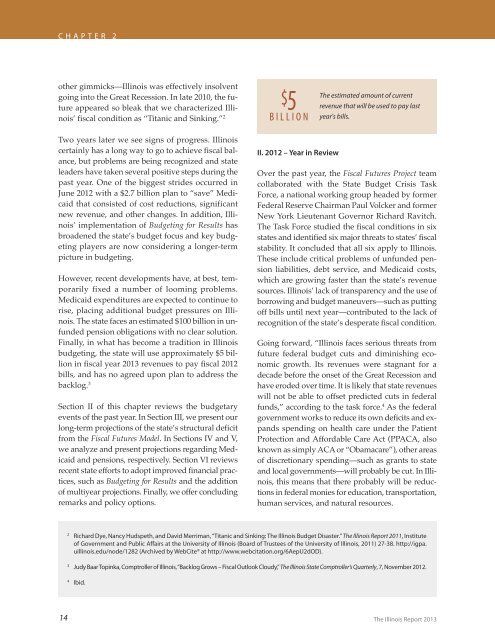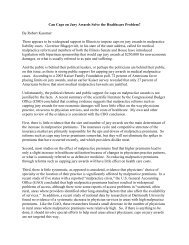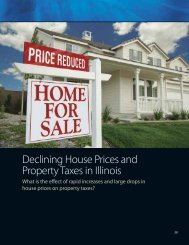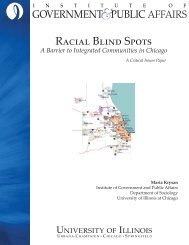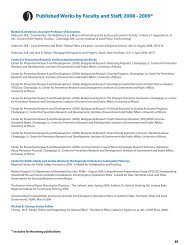The Illinois Report 2013 - Institute of Government & Public Affairs ...
The Illinois Report 2013 - Institute of Government & Public Affairs ...
The Illinois Report 2013 - Institute of Government & Public Affairs ...
Create successful ePaper yourself
Turn your PDF publications into a flip-book with our unique Google optimized e-Paper software.
C H A P T E R 2<br />
other gimmicks—<strong>Illinois</strong> was effectively insolvent<br />
going into the Great Recession. In late 2010, the future<br />
appeared so bleak that we characterized <strong>Illinois</strong>’<br />
fiscal condition as “Titanic and Sinking.” 2<br />
$5<br />
B I L L I O N<br />
<strong>The</strong> estimated amount <strong>of</strong> current<br />
revenue that will be used to pay last<br />
year's bills.<br />
Two years later we see signs <strong>of</strong> progress. <strong>Illinois</strong><br />
certainly has a long way to go to achieve fiscal balance,<br />
but problems are being recognized and state<br />
leaders have taken several positive steps during the<br />
past year. One <strong>of</strong> the biggest strides occurred in<br />
June 2012 with a $2.7 billion plan to “save” Medicaid<br />
that consisted <strong>of</strong> cost reductions, significant<br />
new revenue, and other changes. In addition, <strong>Illinois</strong>’<br />
implementation <strong>of</strong> Budgeting for Results has<br />
broadened the state’s budget focus and key budgeting<br />
players are now considering a longer-term<br />
picture in budgeting.<br />
However, recent developments have, at best, temporarily<br />
fixed a number <strong>of</strong> looming problems.<br />
Medicaid expenditures are expected to continue to<br />
rise, placing additional budget pressures on <strong>Illinois</strong>.<br />
<strong>The</strong> state faces an estimated $100 billion in unfunded<br />
pension obligations with no clear solution.<br />
Finally, in what has become a tradition in <strong>Illinois</strong><br />
budgeting, the state will use approximately $5 billion<br />
in fiscal year <strong>2013</strong> revenues to pay fiscal 2012<br />
bills, and has no agreed upon plan to address the<br />
backlog. 3<br />
Section II <strong>of</strong> this chapter reviews the budgetary<br />
events <strong>of</strong> the past year. In Section III, we present our<br />
long-term projections <strong>of</strong> the state’s structural deficit<br />
from the Fiscal Futures Model. In Sections IV and V,<br />
we analyze and present projections regarding Medicaid<br />
and pensions, respectively. Section VI reviews<br />
recent state efforts to adopt improved financial practices,<br />
such as Budgeting for Results and the addition<br />
<strong>of</strong> multiyear projections. Finally, we <strong>of</strong>fer concluding<br />
remarks and policy options.<br />
II. 2012 – Year in Review<br />
Over the past year, the Fiscal Futures Project team<br />
collaborated with the State Budget Crisis Task<br />
Force, a national working group headed by former<br />
Federal Reserve Chairman Paul Volcker and former<br />
New York Lieutenant Governor Richard Ravitch.<br />
<strong>The</strong> Task Force studied the fiscal conditions in six<br />
states and identified six major threats to states’ fiscal<br />
stability. It concluded that all six apply to <strong>Illinois</strong>.<br />
<strong>The</strong>se include critical problems <strong>of</strong> unfunded pension<br />
liabilities, debt service, and Medicaid costs,<br />
which are growing faster than the state’s revenue<br />
sources. <strong>Illinois</strong>’ lack <strong>of</strong> transparency and the use <strong>of</strong><br />
borrowing and budget maneuvers—such as putting<br />
<strong>of</strong>f bills until next year—contributed to the lack <strong>of</strong><br />
recognition <strong>of</strong> the state’s desperate fiscal condition.<br />
Going forward, “<strong>Illinois</strong> faces serious threats from<br />
future federal budget cuts and diminishing economic<br />
growth. Its revenues were stagnant for a<br />
decade before the onset <strong>of</strong> the Great Recession and<br />
have eroded over time. It is likely that state revenues<br />
will not be able to <strong>of</strong>fset predicted cuts in federal<br />
funds,” according to the task force. 4 As the federal<br />
government works to reduce its own deficits and expands<br />
spending on health care under the Patient<br />
Protection and Affordable Care Act (PPACA, also<br />
known as simply ACA or “Obamacare”), other areas<br />
<strong>of</strong> discretionary spending—such as grants to state<br />
and local governments—will probably be cut. In <strong>Illinois</strong>,<br />
this means that there probably will be reductions<br />
in federal monies for education, transportation,<br />
human services, and natural resources.<br />
2<br />
Richard Dye, Nancy Hudspeth, and David Merriman, “Titanic and Sinking: <strong>The</strong> <strong>Illinois</strong> Budget Disaster.” <strong>The</strong> <strong>Illinois</strong> <strong>Report</strong> 2011, <strong>Institute</strong><br />
<strong>of</strong> <strong>Government</strong> and <strong>Public</strong> <strong>Affairs</strong> at the University <strong>of</strong> <strong>Illinois</strong> (Board <strong>of</strong> Trustees <strong>of</strong> the University <strong>of</strong> <strong>Illinois</strong>, 2011) 27-38. http://igpa.<br />
uillinois.edu/node/1282 (Archived by WebCite® at http://www.webcitation.org/6AepU2dOD).<br />
3<br />
Judy Baar Topinka, Comptroller <strong>of</strong> <strong>Illinois</strong>, “Backlog Grows – Fiscal Outlook Cloudy,” <strong>The</strong> <strong>Illinois</strong> State Comptroller’s Quarterly, 7, November 2012.<br />
4<br />
Ibid.<br />
14<br />
<strong>The</strong> <strong>Illinois</strong> <strong>Report</strong> <strong>2013</strong>


